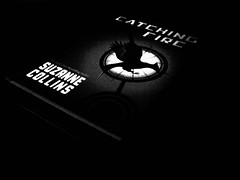| Catching Fire Edit.jpeg (Photo credit: 1:00 AM) |
The point that the author, Paul Risker, is making is that the character of Katniss "is meticulously constructed to be an idealised role model," and he argues this with a lot of support from the text. The "meticulous construction" is the thing that strikes me as the key to why The Hunger Games works as a whole, and here I've got to refer to the last big thing, the Twilight saga. I never got into that, mainly because the heroine is so . . . well, boring doesn't begin to capture what she is. She's self-absorbed and selfish, she uses people who care about her, and she's pretty much unlikeable, as far as I'm concerned. My point here is that she is no kind of a role model for anybody who has anything resembling self-respect. Now, I'm not looking for a role model myself, but I can see that Risker is right about what the films do with Katniss. However, he also seems to feel that she's a bit too perfect, and I have to disagree on that score. She's not flawless.
Anyway, I'm thankful (ahead of time) that he gave me something to write about so that I'm getting close to hitting my goal of 20 posts for the semester.










